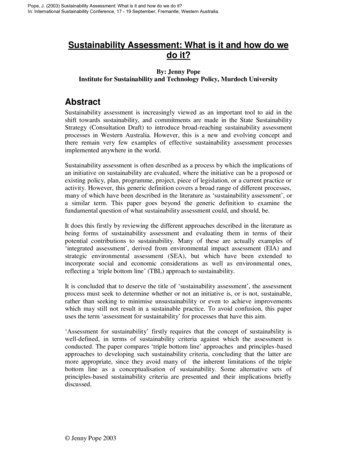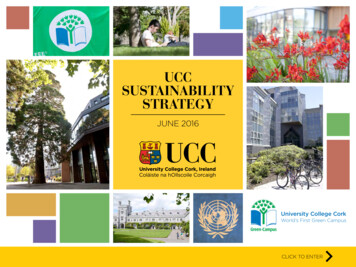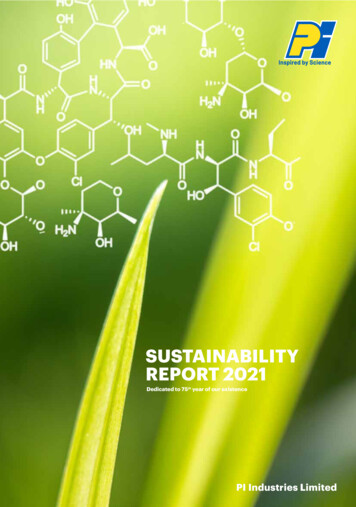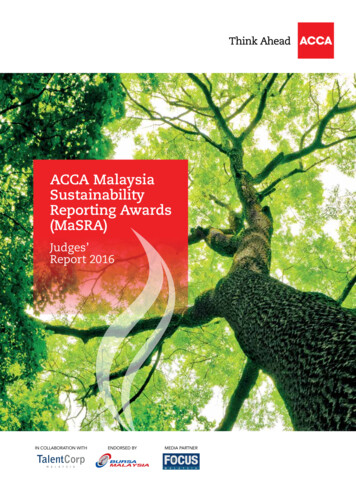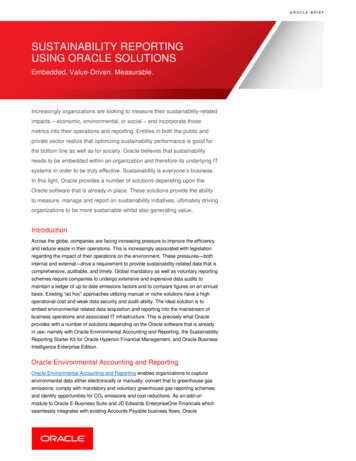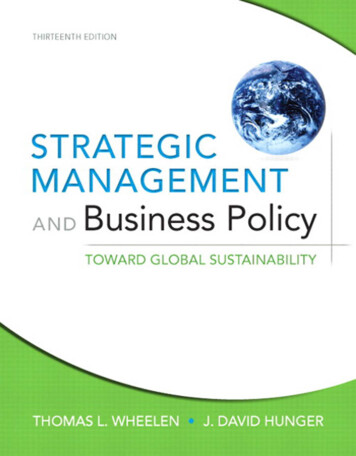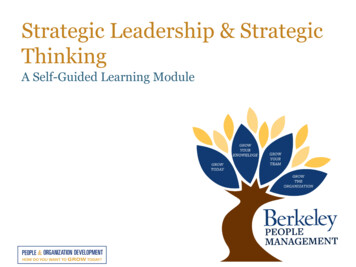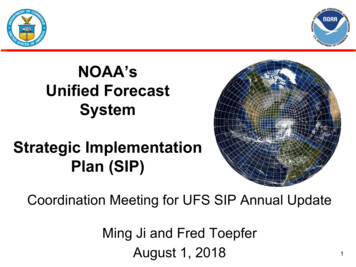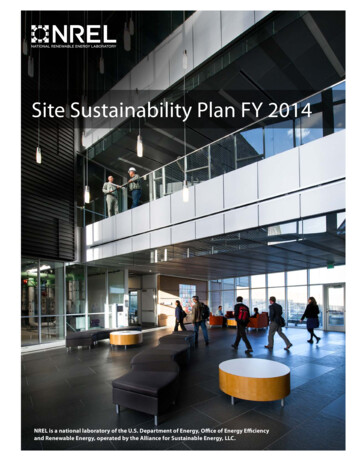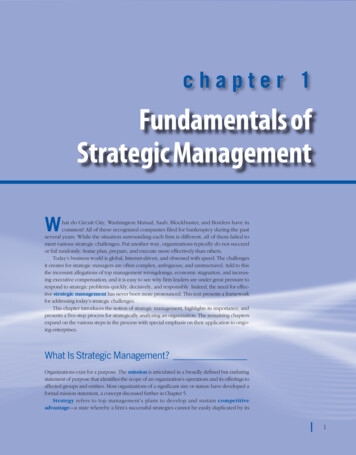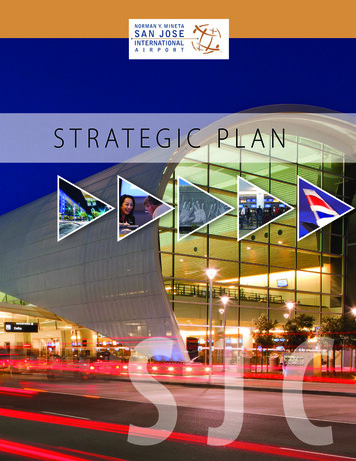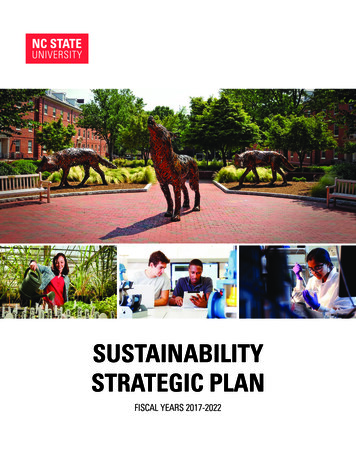
Transcription
SUSTAINABILITYSTRATEGIC PLANFISCAL YEARS 2017-2022
We are pleased to adopt NC State’ssecond Sustainability Strategic Plan,which sets forth an ambitious setof goals and strategies that willadvance the sustainability of ouruniversity. Implementing this planwill further sustainability while alsocontributing toward The Pathway tothe Future: NC State’s 2011-2020Strategic Plan.As a thriving research university,NC State’s contributions towarda sustainable future are uniqueand vital. We prepare studentswith sustainability knowledge andreal-world experience for impactfulcareers and lives. We fuel researchbreakthroughs and solutions thatsolve complex sustainability challenges. We practice what we teach,modeling sustainable best practiceson campus that drive efficiency andexcellence.With the spirit of innovation, collaboration and purpose that permeatesour university community, we willwork together toward a prosperousand sustainable future.W. Randolph WoodsonChancellorWarwick A. ArdenExecutive Vice Chancellor andProvostScott R. DouglassVice Chancellor, Finance andAdministration2 Sustainability Strategic Plan
PATHWAY TO A SUSTAINABLE FUTURENC State’s 2017-2022 Sustainability Strategic Plan is a five-year roadmapthat builds upon the university’s strengths, momentum, and decades ofsustainability progress. The campus-wide Sustainability Council and itsworking groups – with extensive involvement from the university community– developed the Sustainability Strategic Plan. The plan has been endorsed atthe highest levels of university leadership and is in effect from July 1, 2017,through June 30, 2022.VISIONMISSIONNC State developsleaders and innovationsthat create a moresustainable world.Engaging campusand community increating a moresustainable future.GOAL 1: STUDENT LEADERSHIPEngage students in initiatives that promote leadership and service insustainability.GOAL 2: ACADEMICSIntegrate sustainability into education, experiences, and research.GOAL 3: OPERATIONS, PLANNING, AND DESIGNModel sustainability through efficient, innovative facilities and operationsthat educate the campus community and improve the quality of life.GOAL 4: COMMUNITY AND CULTUREAccelerate a culture of sustainability, inclusivity, and well-being on campus and inthe community.GOAL 5: COMMUNICATIONSPropel awareness and sustainability at and beyond NC State.Sustainability Strategic Plan 3
WHY SUSTAINABILITY?Our communities, state, nation, and world faceincreasingly complex challenges that impact ourenvironment, our economy, and our society.Successful sustainability pursues balanced,ethical solutions that are economically viable,environmentally sound, and socially just so thatcurrent and future generations may thrive.The environment was the primary focus of NCState’s early sustainability efforts. In thedevelopment of this strategic plan, the universitycommunity expressed a desire to broaden NCState’s scope of sustainability to includeeconomic and social dimensions that addresscomplex challenges such as human health andwell-being, poverty, equity, and justice.Implementing the strategic plan providesopportunities to demonstrate the tradeoffsinherent with making sustainable decisions. Withthis multidimensional approach, NC State willengage campus and community in creating amore sustainable future.SUSTAINABILITY ANDHIGHER EDUCATIONThere are unprecedented challengesfacing our increasingly connected world,and sustainability leaders and innovations have never been more vital. Institutions of higher education are crucial topreparing graduates equipped to lead,to serve, and to solve complex social,environmental, and economic problems.Through implementation of the Sustainability Strategic Plan, sustainability willbe integrated into NC State’s education, experiences, and research. MoreNC State students will be engaged ininitiatives that promote leadership andservice in sustainability. Campus willmodel sustainability through efficient,innovative facilities and operationsthat educate the campus communityand improve quality of life. A cultureof sustainability, inclusivity, and wellbeing will be accelerated on campusand in the community. These initiatives,plus active communication efforts, willpropel sustainability at and beyond NCState. NC State will emerge by 2022 asone the nation’s leading universities forsustainability education, operations, andengagement.STRATEGIC PLANNING PROCESS AND BACKGROUNDThis plan builds on decades of progress that has established NC State as a sustainability leader. The university is a frequentrecipient of local, regional, and national sustainability honors, including the 2016 achievement of a Gold rating in theSustainability Tracking Assessment and Rating System (STARS) offered through the Association for the Advancement ofSustainability in Higher Education (AASHE).Much of this progress was catalyzed by the university’s inaugural Sustainability Strategic Plan (2011-2016) led by theuniversity-wide Campus Environmental Sustainability Team (CEST). Innovations in energy, water, transportation,purchasing, waste reduction, land use, and buildings created ongoing opportunities for campus to become a livingclassroom, where NC State students learn and conduct research. These advances solidified the university’s sustainabilitycommitment, leading to the adoption of a University Sustainability Policy in 2014.NC State began developing the 2017-2022 Sustainability Strategic Plan in 2015 under the leadership of the SustainabilityCouncil.4 Sustainability Strategic Plan
ALIGNMENT WITH NC STATE’SSTRATEGIC PLANIMPLEMENTATIONSTRATEGYThe Sustainability Strategic Plan and theuniversity’s Strategic Plan, Pathway tothe Future, are vitally linked. Sustainability contributes toward the universityplan’s success and is foundational toaccomplishing the university’s five majorstrategic goals:Each fiscal year theSustainability Council’sfive working groups willcreate and implementStudentannual tactics to driveLeadershipprogress toward the plan’sgoals, strategies, andobjectives. Tactics will becreated based on feasibility, cost, and potentialimpact to ensure soundstewardship of the university’s resources.1.2.3.4.5.Enhance the success of ourstudents through educationalinnovation.Enhance scholarship and researchby investing in faculty andinfrastructure.Enhance interdisciplinaryscholarship to address the grandchallenges of society.Enhance organizational excellenceby creating a culture of constantimprovement.Enhance local and globalengagement through focusedstrategic partnerships.Community& CultureOperations,Planning & ng groups meet regularly and welcome participation fromanyone on campus or in the community. Each working group has achairperson(s) who leads the group and is part of the SustainabilityCouncil’s steering committee.Each working group has been assigned a specific goal, andcollaboration across working groups is vital as the plan’s five majorgoals are interdependent. Success in one area can springboardsuccess in another, and the Sustainability Council’s steeringcommittee will create mechanisms for regular communicationamong working groups. In some cases, multiple working groups arepursuing similar strategies, making collaboration even more crucial.Working groups will track both quantitative and qualitative measuresof progress, which will be monitored through the university’s AnnualSustainability Report that is published during the fall semester.September 2015The Provost and Vice Chancellorfor Finance and Administrationestablished the SustainabilityCouncil to lead developmentand implementation of NCState’s second SustainabilityStrategic Plan.January 2016Campus and community membersprovided online andin-person feedback onsustainabilityprogress anddesired future goals.September - December 2016Campus and community members provided feedback on thedraft plan. The SustainabilityCouncil steering committeeevaluated all comments andincorporated common themes.July 1, 2017 June 30, 2022Implementation ofthe plan.2015 2016 2017February - August 2016Five Sustainability Council working groups withcampus-wide representatives formed and usedcampus feedback to develop the draft plan.Spring 2017The plan was finalized andapproved by universityadministration.Sustainability Strategic Plan 5
GOAL 1: STUDENT LEADERSHIPEngage students in initiatives that promoteleadership and service in sustainability.Enhancing studentsuccess is one of NCState’s foundational goals,and that success extendsbeyond the classroom.Sustainability provides an ideal backdropfor creation of high-impact educationalexperiences that reinforce academicexcellence, while equipping studentsto serve and to lead. These efforts helpdevelop successful NC State graduateswho are well prepared for impactfulcareers and lives.UNIVERSITY STRATEGIC PLANThis goal contributes toward thefollowing university strategic goal:Goal1Enhance Student Success6 Sustainability Strategic Plan
STRATEGIES AND OBJECTIVESStrategy 1: Increase studentinvolvement with high-impact,co-curricular experiences insustainability.A.B.C.D.E.F.Increase student engagement insustainability-focused student trips.Expand sustainability-relatedcompetitions for students.Increase the diversity and numberof student organizations engaged insustainability initiatives, events, andprogramming.Engage more students insustainability-related service learningand community service.Increase the resources and supportavailable for sustainability-relatedstudent organizations.Develop a sustainability co-curriculum.Strategy 2: Expand sustainabilitytraining and outreach for students.A.B.Create a sustainability workshopseries that contributes toward studentleadership development.Include sustainability education in NewStudent Programs, University Housing,University and college ambassadors,and Fraternity and Sorority Life.MEASURES OF SUCCESS1. Increased participation insustainability-focused tripsand competitions2. Growth in the number ofstudent organizations that selfdesignate as sustainability-related on the Student Involvement portal3. Rise in the number of sustainability-related outreach andtraining offerings for students4. Increased number of registered student organizationscertifying campus events assustainableShared strategy with Academics (strategy 3)Sustainability Strategic Plan 7
GOAL 2: ACADEMICSIntegrate sustainability into education,experiences, and research.perspectives required to tackle complexchallenges.Sustainability is a fundamental perspective for enhancing the critical andcreative thinking that NC State fosters instudents. Sustainability is already present in many academic programs and cocurricular activities. There is opportunityfor more robust integration of sustainability so that NC State becomes thefirst choice for incoming students whoseek to create a more sustainable future.Campus-wide coordination of sustainability programs will ensure that every student has access to sustainability-relatedlearning experiences. A multidisciplinaryemphasis will lead to more sustainabilityrelated research breakthroughs at NCState.UNIVERSITY STRATEGIC PLANThis goal contributes toward thefollowing university strategic goals:Goal1Society’s grand challengesrequire leaders who canrecognize complexitiesand create innovativesolutions to sustainabilitychallenges.8 Sustainability Strategic PlanSustainability experiences inside andoutside the classroom contribute to NCState’s first priority: enhancing studentsuccess and equipping students forimpactful careers and lives. Sustainability bridges academic disciplines andtranscends their boundaries, bringingtogether the varied skills and diverseEnhance Student SuccessGoalSupport InterdisciplinaryScholarshipGoalPursue OrganizationalExcellence34Goal5Engage Locally and Globally
STRATEGIES AND OBJECTIVESD.Strategy 1: Enhance cohesionamong academic programs thataddress sustainability.A.Establish and support an administrative framework that coordinatesacademic sustainability programs.Strategy 2: Ensure that every NCState undergraduate studentengages in coursework withcritical and creative thinking andsubstantive learning outcomesfocused on sustainability.A.B.Develop a sustainability generaleducation program (GEP) category orgroup of classes.Develop a coordinated NC Stateannual sustainability theme to beincorporated into the curriculum.Shared objective with Community andCulture (strategy 1B)Strategy 3: Facilitate opportunitiesfor NC State students to participate in high-impact academicexperiences in sustainability.A.B.C.E.Provide students with sustainabilityrelated professional developmentopportunities.Better coordinate and communicatehigh-impact academic opportunitiesfocused on sustainability.Create team-taught courses or seminars focused on current sustainabilityissues.Strategy 5: Establish NC State asan institution that develops sustainability stewards and leaders.A.B.B.C.Engage faculty and students fromacross the university with real-world,community-identified projects to meetthe partnering community’s sustainability priorities.Develop a sustainability leadershipcertificate.Strategy 6: Establish NC State asthe first choice for prospective students committed to sustainability.A.Engage with high school faculty/administration and students aboutsustainability education and programming at NC State.Strategy 7: Engage externalstakeholders in supporting NCState’s academics sustainabilityinitiatives.A.Strategy 4: Increase the demographic and disciplinary diversityof the NC State community engaged in sustainability academics.Create diversity through high schoolrecruiting into sustainability-orientedacademic programs, with a focuson attracting students from groupstraditionally underrepresented in suchprograms.Continue to develop courses andcourse modules in environmentaljustice and equity.Partner with regional minority-servinginstitutions in student service andStrategy 9: Increase theuniversity’s profile insustainability-related research.A.Solicit external funds for research seedfunding in sustainability.Shared objective with Community andCulture (strategy 1F)Shared objective with Community andCulture (strategy 2A)Shared strategy with Student Leadership(strategy 1)A.action research projects.Foster the development of multidisciplinary scholarship and research byfaculty focused on sustainability.Support and reward faculty in developing and teaching multidisciplinarycourses that address sustainabilityacross departments and colleges.MEASURES OF SUCCESS1. Creation of an academicsustainability coordinatorand demonstrated progresstoward academic cohesionaround sustainability2. Continued increase inundergraduate academicengagement and learningoutcomes in sustainability3. Increased participation in highimpact academic experiencesthat are sustainability-focused4. Enhancement of existing anddevelopment of new sustainability research initiatives5. Increased communityengagement in academicsustainability activities andprogramsBring external stakeholders to campus for sustainability activities andprograms, such as presenting lecturesand seminars, advising students andfaculty engaged in sustainability projects, judging student presentationsand posters in classes, and campusresearch events.Shared objective with Community andCulture (strategy 3B)Strategy 8: Establish newsustainability student scholarshipsand fellowships.A.Create a funding program to whichstudent teams can apply for supportfor sustainability research.Shared objective with Community andCulture (strategies 1F)Sustainability Strategic Plan 9
GOAL 3: OPERATIONS, PLANNING AND DESIGNModel sustainability through efficient, innovativefacilities and operations that educate the campuscommunity and improve the quality of life.A university campus hasmore value than ever as aplace for real-world learning in today’s technologyrich world.The university’s role is to teach, showcase, and challenge our community’sunderstanding of the complex costand benefit tradeoffs associated withdecisions. When NC State minimizesenvironmental impacts in our community, state, and world and models bestpractices in areas including energy, water, air quality, waste reduction, purchasing, computing, and food, it improves thesustainable quality of life on campus.NC State practices what it teaches, creating a campus community that valuesstewardship, embodies excellence, andenhances quality of life. The university’ssimultaneous pursuit of environmental, economic, and social sustainabilitydemonstrates the leadership required toaddress society’s grand challenges.UNIVERSITY STRATEGIC PLANSTRATEGIES AND OBJECTIVESStrategy 1: Reduce NC State’stotal greenhouse gas emissions by25 percent from the 2008 baseline.Strategy 3: Expand the amount ofrenewable energy used to meetNC State’s needs.Strategy 2: Reduce existing building annual energy use per squarefoot by 40 percent from the 2002baseline.Strategy 4: Reduce campus waterconsumption by 65 percent fromthe 2001 baseline.A.This goal contributes toward thefollowing university strategic goal:Goal4Pursue OrganizationalExcellenceB.C.10 Sustainability Strategic PlanOptimize building energy usagethrough retro-commissioning,continuous commissioning, andoccupant education.Explore and develop best practices forintelligent infrastructure and energygeneration use in campus buildings.Reduce energy use within the fiveCentral Utility Plants by 5 percent fromthe 2015 baseline.A.B.C.Expand the use of reuse (reclaimed ornon-potable) water on campus.Reduce water use in campusbuildings.Implement landscaping that reducespotable water consumption.Strategy 5: Enhance and coordinate stormwater efforts to ensurewater quality for the university’s
growing campus.A.B.Develop a master plan for providingwatershed-based regional stormwatertreatment for new and future development and retrofits.Improve the stormwater control measure program by providing feedback ondevices under construction and involving students in ongoing water qualitymonitoring.Strategy 6: Reduce single-occupancy vehicles on campus by5 percent for employees and 7percent for students from the 2015baseline.A.B.C.D.E.F.Renew NC State’s designation as aBicycle Friendly University.Enhance Wolfline bus system servicedelivery in order to build annual ridership to 3.5 million by 2022.Increase and enhance campuswalkability by realizing a 2.5 percentincrease in intra-campus walking travelers from the 2015 baseline.Increase student and employee use ofcarpooling by 3 percent over the 2015baseline.Promote alternative fuel usage forcommuting by aiming for 0.5 percentof permitted vehicles to hold an electric vehicle (EV) permit by 2022.Work with community partners tomake data-driven decisions aboutalternate transportation modes.Strategy 7: Reduce the consumption of and demand for petroleumproducts in the university fleet.A.Create a baseline for university-widefleet metrics.C.and training plans that will reduce theamount of recyclable material fromentering the campus waste stream.Develop a robust campus-wide, on-sitecomposting program that creates aclosed-loop system for food wastegenerated on campus.2. Decreased building energy useper gross square foot3. Decreased total campuswater consumption andpotable water consumptionper gross square footA.4. Reduction of single-occupancyvehicles on campusB.C.D.Create a sustainable purchasinginitiative with experts to guide wastediversion and sustainable sourcing.Instill the values of total cost ofownership and total life cycle cost inpurchasing and decision-making.Develop a system to track and quantifysustainable purchases fromMarketPlace, the university’s materialmanagement and purchasing systemand in large bids and contracts.Develop incentives for makingenvironmentally sound purchases forexternally-funded research projects.5. Reduction in total wastegenerated6. Increased diversion of wastefrom landfill7. Increased use of local foodproducts (within 300 miles)and North Carolina produce8. Reduction in petroleum-basedfuels for campus fleet vehicles9. Increased campus squarefootage certified Leadershipin Energy and EnvironmentalDesign (LEED) silver or higherStrategy 10: Exemplify a sustainable food system from origin toplate by adding capacity to growfood on campus land for campusdining facilities.A.B.C.Increase production to more than7,000 pounds per year at theAgroecology Education Farm in yearone and a 10 percent increase in eachsubsequent year.Introduce culinary gardens accessibleto campus chefs for incorporatingingredients into meals.Increase NC State’s use of NorthCarolina produce by 20 percent fromthe 2013 baseline.Further promote the availability andbenefits of healthy food.D.A.Strategy 11: Continue to raiseawareness for Socially Responsible Investing (SRI) and Environmental, Social and Governance(ESG) investing.B.1. Reduction in greenhouse gasemissionsStrategy 9: Implement sourcereduction and environmentallypreferable purchasing initiatives todecrease waste before it occurs.Strategy 8: Achieve a 70 percentlandfill diversion rate from the2006 baseline toward zero waste.Complete and communicate a ZeroWaste Management Plan that willguide the vision for zero waste management practices, define meaningfultargets, and address education andresearch needs.Utilize the 2015 Waste CharacterizationStudy to develop focused educationalMEASURES OF SUCCESSA.B.Offer another option for philanthropicfunds to the university’s alumni and forother donors.Strategy 12: Utilize informationtechnology to reduce resource useacross campus.A.B.C.Increase on-campus partnerships tohelp students, faculty, and staff reduceuse of paper by increasing digitization.Increase use of virtual meetings toreduce travel and costs and increaseefficiency.Evaluate additional energy efficiencyefforts with data centers, equipmentpurchases, and data storage options.Expand investment strategies as NCState’s SRI Fund assets continue togrow.Sustainability Strategic Plan 11
GOAL 4: COMMUNITY AND CULTUREAccelerate a culture of sustainability, inclusivity,and well-being on campus and in the community.Sustainability becomespart of NC State’s cultureas more people championsustainability efforts at every level of the university.The greater the involvement, the greaterthe impact -- both on campus and inthe community. NC State’s integrationof sustainability into university planning, decision-making, and operationsexemplifies sustainability leadership andcontributes toward continued economic,environmental, and societal prosperity.UNIVERSITY STRATEGIC PLANThis goal contributes toward thefollowing university strategic goals:Goal1Goal4Goal5Enhance Student SuccessPursue OrganizationalExcellenceEngage Locally and Globally12 Sustainability Strategic Plan
STRATEGIES AND OBJECTIVESStrategy 1: University leadershipwill actively promote, encourage,and celebrate a culture of sustainability.A.B.C.D.E.F.G.Encourage division and departmentalownership and action to make sustainability accessible to the entire campuscommunity with the expectation thatall programs and events incorporatesustainability.Establish a coordinated NC State annual sustainability theme to promoteawareness and action across all campus units and to be incorporated intothe curriculum to brand the universityas a sustainability champion.Infuse an institutional commitment tosustainability in all aspects of campusand community life such as programming, event planning, transportationto meetings, everyday language, andorientation and hiring processes.Create incentives for all campusstakeholders to embrace and celebratesustainability and to establish clearaccountability methods and standardsacross departments and programs inorder to ensure compliance.Enhance and/or create campustraditions that encourage sustainablechange through personal or teamchallenges.Include sustainability as part of university campaign and top-level fundraisingpriorities and strategies so that funding is secured for student high-impactexperiences, undergraduate research,awards, curriculum development,scholarships and grants, programming,immersion experiences, residence life,and research seed funding.Explore how to scale and replicate ourwork and lead across the University ofNorth Carolina system and the state.Shared objective with Academics (strategy 2B)Shared objective with Academics (strategy 8Aand 9A)Strategy 2: Embrace and demonstrate an expanded definition/vision of sustainability that pursues improvement of the humancondition, respect for all membersof the community, social justice,diversity and inclusion, work-lifebalance, workplace and campussafety, and wellness.A.B.C.Develop and implement a social andenvironmental justice narrative for NCState so that as, a campus community, we acknowledge and embrace aculture of inclusion.Integrate concepts of entrepreneurship and social innovation into ourunderstanding of sustainability andencourage areas of related researchand practice.Collaborate with and support the efforts of the University Wellness TaskForce to create and maintain a culturethat supports and promotes the overallwellness of NC State students, faculty,and staff.Shared objective with Academics (strategy 4B)Strategy 3: Develop the connectivetissue with our campus andTriangle community in order tobridge our collective vision to“think and do” as we addresssociety’s grand challenges.A.B.Develop a thriving network/community of external partners committed toadvancing the university’s sustainabilitygoals and vision.Facilitate communication and engagement with external stakeholders toleverage sustainability efforts for largerMEASURES OF SUCCESS1. Increased consideration forsustainability within NC State’smission, planning, organizational structure, accreditation,personnel, resource allocation,and operations2. Increased number of sustainability-related events andWolfpack Certified Sustainableworkplaces and events3. Sustained percent of students,faculty, staff, and alumni whostate sustainability influencedtheir decision to come to NCState4. Growth in participation atsustainability-related eventsand programs5. Increased environmental andsocial justice partnerships andprogramming6. Growth in the number ofsustainability-related start upenterprises launched and startup competitions heldcollective impact, such as intentionallysharing knowledge and resources.Shared objective with Academics (strategy 7A)Sustainability Strategic Plan 13
GOAL 5: COMMUNICATIONPropel awareness and sustainability atand beyond NC State.Effective communicationis foundational for the success of NC State’s Sustainability Strategic Plan.STRATEGIES AND OBJECTIVESStrategy 1: Raise awareness ofsustainability at NC State amonginternal and external stakeholders.A.Communication about the plan and itsprogress will help raise the profile ofsustainability, prompting more people toconsider their individual and collectiveimpact.UNIVERSITY STRATEGIC PLANThis goal contributes toward thefollowing university strategic goals:Goal3Goal4Support InterdisciplinaryScholarshipPursue OrganizationalExcellenceB.C.Incorporate sustainability into the NCState brand.Gain national recognition for NCState’s sustainability successes.Promote awareness of NC State’sSustainability Strategic Plan.Strategy 2: Better integratesustainability communicationsacross campus to improvefrequency and consistency ofsustainability communications.A.Develop a network of communications professionals across campus toencourage two-way communicationsabout sustainability issues.Strategy 3: Provide communications resources and tools to promote and support sustainability atNC State.A.B.C.Develop a messaging strategy andframework for how to communicateabout sustainability.Develop a toolkit for incorporatingsustainability into communicationsDevelop a set of sustainablecommunications best practices forcommunicators.Strategy 4: Make communicationsa key part of sustainability planning and execution.A.Identify sustainability programs,projects, or progress that require outreach efforts and/or meet institutionalqualifications for promotion to internalor external audiences.MEASURES OF SUCCESS1. Increased number of annual external media mentions relatedto sustainability at NC State2. Increased number of annualsustainability-related stories inNewswire, NC State’s internalstory sharing website3. University rankings in reputable sustainability indices4. Growth in social mediaengagement5. Rise in website pageviews ofsustainability.ncsu.edu14 Sustainability Strategic Plan
CONTRIBUTORSSpecial thanks to the Sustainability Council and the hundreds of students, faculty, staff and community members who contributed to the creation of this plan.Sustainability CouncilSteering CouncilAda Baldwin, University Housekeeping (Chair, Operations,Planning and Campus Design)Dr. Morton Barlaz, Department of Civil, Construction, andEnvironmental Engineering (Co-Chair, Academics)Elizabeth Benefield, Social Entrepreneurship (Co-Chair,Community and Culture)Austin Bowman, Student (Co-Chair, Student Leadership)Jack Colby, Energy Systems (Co-Chair)Tracy Dixon, University Sustainability Office (Chair, StrategicPlanning)Dr. Frances Graham, African American Cultural Center (CoChair, Community and Culture)Dr. Steve Kelley, Department of Forest Biomaterials (CoChair)Mark Minor, University Communications (Chair,Communications)Dr. Walter Robinson, Department of Marine, Earth, andAtmospheric Sciences (Co-Chair, Academics)Meghan Teten, EcoVillage (Co-Chair, Student Leadership)Community and Culture Working GroupMohammad Assfari, Building Maintenance and OperationsElizabeth Benefield, Social EntrepreneurshipCynelsa Broderick, University Sustainability OfficeStephanie Clark, Arts NC StateNikki Cofield, Human ResourcesStacy Connell, University RecreationDebbie Currie, NCSU LibrariesRebekah Dunstan, University Sustainability OfficeLisa Eberhart, NC State DiningDanielle Fryer, StudentAnalis Fulghum
Much of this progress was catalyzed by the university's inaugural Sustainability Strategic Plan (2011-2016) led by the university-wide Campus Environmental Sustainability Team (CEST). Innovations in energy, water, transportation, purchasing, waste reduction, land use, and buildings created ongoing opportunities for campus to become a living
